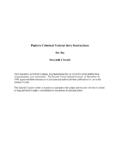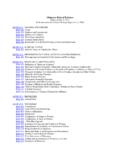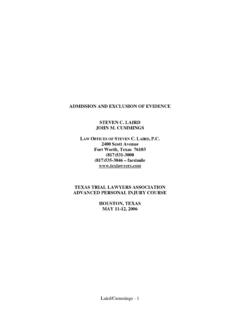Transcription of Trial and Hearing Rules for Judge John E. Dowdell …
1 Trial and Hearing Rules for Judge John E. Dowdell Professionalism, courtesy, decorum, and common sense shall dictate all behavior in this Court. The parties and attorneys will be held to the highest standard of professional conduct, personal and professional courtesy and deportment throughout all proceedings conducted in this Court. 1. Local Rules : You are expected to be familiar with the Local Rules , and in particular with Local Rule (b), concerning courtroom behavior, and adhere strictly to each of the requirements of this rule. 2. General Courtroom Protocol: Do not leave the courtroom while Trial is in progress without obtaining leave of Court.
2 Attorneys should not directly address opposing counsel in open court without leave of Court. Computers may be used by counsel, as long as such use is unobtrusive and is cleared through the courtroom deputy prior to the morning of Trial . Do not place on the courtroom furniture, including chairs, conference tables, or benches, any objects which might scratch or mar the surfaces including briefcases with metal closures or feet, demonstrative aids, exhibits, etc. Do not chew gum or eat mints, candy, etc. in the courtroom. No beverages, including bottled water, are allowed in the courtroom. Coats, umbrellas, or briefcases of attorneys and litigants should be kept in the coat closet behind the defense counsel table.
3 3. Prior to Trial : If you have reason to anticipate that any question of law or evidence is particularly difficult, give the Court as much advance notice as possible. Motions in limine (including Daubert motions) shall be filed in accordance with the Scheduling Order. Motions in Limine filed after the pretrial conference are untimely and will not be considered Objections to proposed jury instructions and pertinent case law should be provided to the Court prior to Trial . 4. Voir Dire: The Court ordinarily conducts voir dire. In the rare circumstance supplemental voir dire examination by counsel has been approved by the Court prior to Trial , the following Rules will apply: Voir dire examination must be conducted in such a fashion as to gain knowledge about a prospective juror which will aid in making an informed challenge.
4 2 Voir dire examination may not be conducted in a manner designed to inform the jury of the anticipated evidence or the applicable law, nor to provide the type of information which is normally included in the opening statement. A statement disguised as a question will not be permitted. Counsel may not ask a question based on a hypothetical statement of the facts or the law. Voir dire may not be used to explain the burden of proof. Do not attempt to elicit promises or assurances of any kind from jurors nor ask them to give any indication of what their verdict would be based on certain conditions or assumptions.
5 5. Opening Statements: Unless the case is unusually complex, each party will be limited to 30 minutes, per side, except in multiple party cases, when time for statements may be substantially reduced, per party. Any additional time is subject to prior approval of the Court. Opening statement is to be used to outline the proposed evidence , not for argument. 6. Exhibits: Court time may not be used for marking exhibits. This must be done in advance of the court session. Advise opposing counsel of the exhibits to be used in advance of the day's court session. Exhibits to which there is no objection should be offered and received in evidence without the necessity of formal identification.
6 Counsel are required to prepare separate exhibit notebooks for: (1) the witness stand; (2) opposing counsel; (3) the Court; and (4) the Court s law clerk. The parties shall provide the exhibit notebooks identified in (3) and (4) at least one week in advance of the pretrial conference. In cases requiring voluminous exhibits, counsel should prepare an exhibit notebook tailored to each witness, or group of witnesses if the group is to give testimony in common. The purpose of this requirement is the elimination of repeated trips by counsel to the witness stand. If counsel intends to question a witness about a group of exhibits, he or she should avoid delay by having the witness notebook already on the witness stand.
7 To the extent possible, the parties should attempt to agree on a set of exhibits for use during Trial in order to eliminate duplicate copies of non-objectionable exhibits. Any exhibits that a party wishes to introduce, but that are objected to, should be included in a separate set of Plaintiff s or Defendant s exhibits. The Court encourages the parties counsel to use the electronic evidence presentation system in the courtroom. Inexperienced users should contact the Court s courtroom deputy to schedule a short training session in advance of Trial . 3 7. Witnesses: Witnesses should be readily available to avoid needless delay, including videotape depositions.
8 At least one day before a court session, advise opposing counsel of the witness(es) who will be called the following day. Please stand whenever you address the Court or interrogate witnesses ( exceptions shall be made for physical infirmities). Use the lectern so that the court reporter can hear you. Examination of a witness will include direct examination, cross examination, one re-direct examination, and one re-cross examination except in exceptional circumstances. Attorneys will not interrupt each other or a witness except to assert an objection, and the attorneys will never interrupt the Court for any reason. Do not greet or introduce yourself to adverse witnesses.
9 Commence your cross-examination without preliminaries. Do not face or otherwise appear to address yourself to jurors when questioning a witness. Except for children, address witnesses by their surnames, for example, Mr. A, Sergeant B, or Doctor C. Never assert your personal opinion as to the credibility of a witness, the culpability of a civil litigant, or the guilt or innocence of an accused, nor as counsel assert personal knowledge of a fact in issue, nor assert a fact not in evidence . Do not react to a statement by another counsel or a witness being examined by another counsel by any gesture or facial expression signifying agreement, disagreement, approval or disapproval.
10 Advise your clients they are subject to this same limitation. Where more than one attorney represents a party, only the attorney handling the particular witness may respond to an objection or raise an objection in regard to his/her testimony. Likewise, only one opposing attorney should make or argue motions or other objections as to that witness. 8. Jury Protocol: Stand a respectful distance from the jury at all times. Statements and arguments to the jury will be made from the lectern. When you object in the presence of the jury, make your objection short and to the point. Do not argue the objection in the presence of the jury, and do not argue with the ruling of the Court in the presence of the jury.






